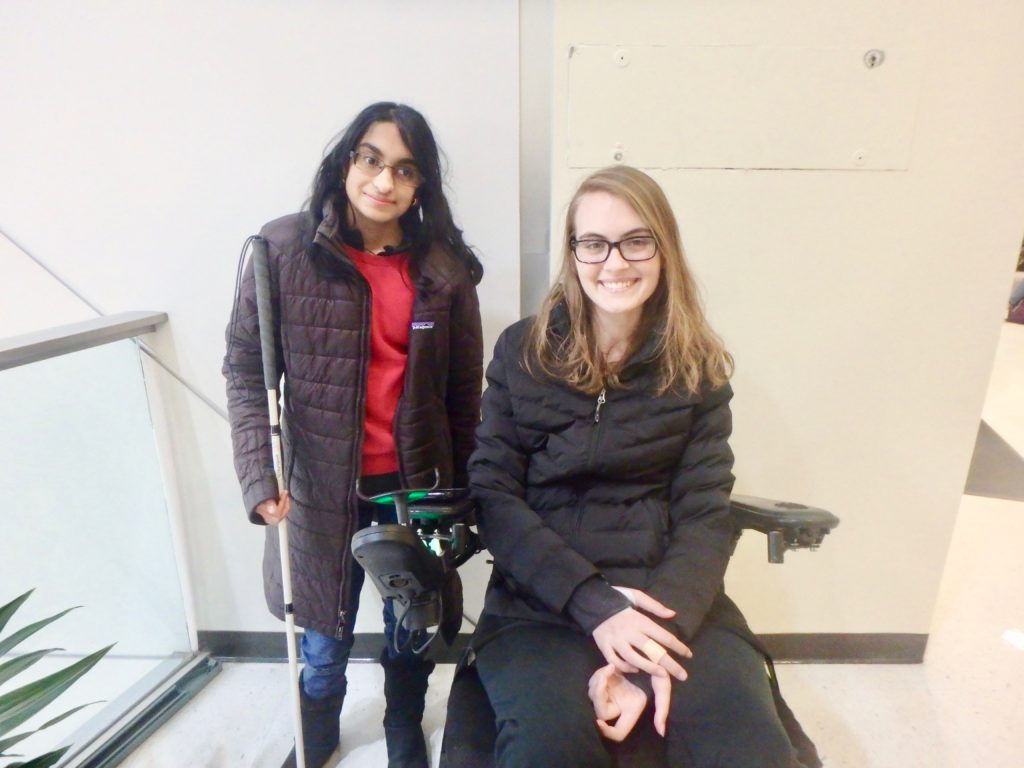
Walk by a student organization fair and you’ll find rows of smiling students handing out flyers promoting an array of activities—from astronomy to environmental awareness to Texas Quidditch. Whether they’re looking to expand their social circles, compete with fellow athletes or pursue and academic interest, students are likely to find an organization that fulfills their needs.
However, not all of these groups are mindful and inclusive of students with both visible and invisible disabilities. To help bring accessibility to the forefront, Kate Strickland and Amita Srinivasan, co-directors of Student Government’s Disabilities and Inclusion Agency, are spearheading a new initiative designed to train and educate members of student organizations on how to support their differently-abled peers.
“Our No. 1 goal is to spread awareness about people with disabilities and to make the campus more accessible for us,” says Srinivasan, a psychology/human dimensions of organizations sophomore. “Every aspect of life—student groups included—should be accessible for people with all kinds of disabilities.”
During the spring 2019 semester, the seven-member agency launched a new disability awareness and advocacy training program designed for student-run organizations, which are not required by the university to maintain even a minimal standard of accessibility. The Disabilities and Inclusion Agency also hosts campus events, such as movie nights and Q&A forums, to educate students about the disability community.
“Taught by students and for students, the training isn’t designed to change the nature of the organizations,” says Strickland, a Plan II Honors/government senior. “Of course, we’re not going to focus on sports groups like wakeboarding because they revolve around a very specific activity. But in the social organizations, there’s a lot of room for them to be more mindful about activities that could be isolating.”
Like many of her fellow freshmen, Strickland joined several groups in the fall of 2013 to make new friends and have some fun. Yet everything changed six weeks into her first semester when she sustained a spinal cord injury from a bike accident. When Strickland returned to campus, she found the groups that once gave her so much enjoyment were no longer welcoming or accessible.
“I found myself feeling very ostracized,” says Strickland, who also serves as treasurer for the disABILITY Advocacy Student Coalition. “Many events were in private homes without wheelchair access, or centered around volleyball games that I couldn’t participate in. Now I want to make sure these orgs are welcoming, inclusive and accessible to students with disabilities.”
Currently the university is home to more than 2,700 students registered with Services for Students with Disabilities (SSD). There are many others who haven’t registered due to the stigma attached to the word “disability,” while others may not even realize they have a disability. Through campus events and trainings, Strickland aims to give students a deeper understanding of this often underrepresented population. She will consider her mission a success if she can empower more students to advocate for their peers.
“In class, it’s embarrassing when the professor has to force someone to partner with me in a group,” Strickland says. “I don’t wish that for any student, especially for those with disabilities. My hope is for the next student sitting in the back corner of the room to be approached by someone who wants to incorporate them.”
This new initiative is supported by several campus partners including SSD, the Student Council for Exceptional Children and the disABILITY Advocacy Student Coalition. Agency members are available for trainings upon request by student organizations. Contact Student Government for more information on how to get involved.


